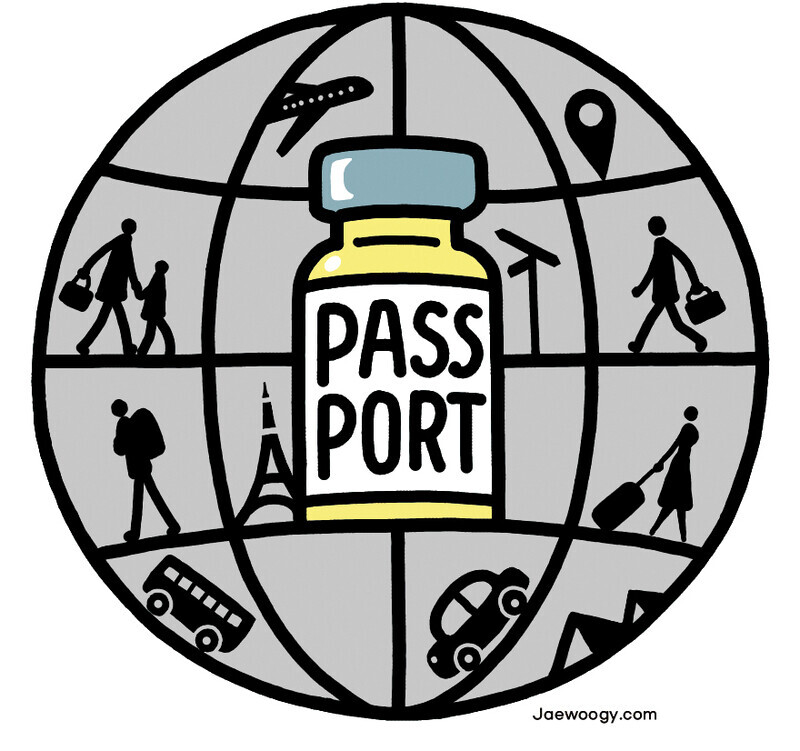hankyoreh
Links to other country sites 다른 나라 사이트 링크
[Column] Efficacy of vaccine passport

The roots of the word “passport” come from medieval Europe, and the documents that were used to pass through the actual ports and city gates that formed national borders.
The oldest recorded form of passport is found in the Old Testament book of Nehemiah, where the king of the Persian Empire issues a request for safe conduct when his subject Nehemiah wishes to travel to Judea. It was around 450 BCE when these papers were drawn up as a request to the ruler on the other side of the river for safe passage and travel for the bearer.
The arrival of passports in the modern sense as a country’s proof of the holder’s citizenship came about in 1414 during the reign of King Henry V of England. Different countries maintained different forms until 1920 when passports were standardized by the League of Nations.
These days, there is a vigorous global debate over adopting a new form of passport — one for people vaccinated against COVID-19.
Iceland began issuing COVID-19 vaccine certifications on Jan. 26 of this year. Major tourist destinations such as Greece, Spain and Italy have formalized the adoption of vaccine passports to pave the way for a tourism industry recovery. In Israel and Denmark, plans are underway for vaccination certifications to be used as a form of “green pass,” granting the ability to travel and visit restaurants, cinemas, concerts, and sporting events.
On April 1, then-South Korean Prime Minister Chung Sye-kyun announced plans for adopting vaccine passports within the month. They would take the form of a “COVID-19 vaccination certificate” smartphone app.
There have been arguments that proof of COVID-19 vaccination should be treated on par with the certification of malaria prevention use and yellow fever vaccination required when visiting certain African countries.
It’s a different situation, however. Unless those proofs of prevention by people visiting a particular country, the proof of COVID-19 vaccination effectively grants a form of privilege to a certain segment of the public.
Health policy officials in the UK, Germany and France said they oppose the vaccine passports because they would end up being discriminatory. In a recent briefing, the White House said it did not plan to introduce vaccine passports at the federal level due to concerns about privacy and human rights infringements.
People are hoping that the vaccine passports can serve as a magic bullet for reviving the tourism industry. But there are too many holes that need to be patched up.
Not only do the different vaccines differ in their effects, but it has not been shown that vaccination eliminates the risk of transmission 100 percent. It’s also unclear what effect they have against virus variants and how long immunity lasts.
Issues of personal information leaks and forgery are other challenges that need to be addressed.
By Koo Bon-kwon, senior staff writer
Please direct comments or questions to [english@hani.co.kr]

Editorial・opinion
![[Column] Life on our Trisolaris [Column] Life on our Trisolaris](https://flexible.img.hani.co.kr/flexible/normal/500/300/imgdb/original/2024/0505/4817148682278544.jpg) [Column] Life on our Trisolaris
[Column] Life on our Trisolaris![[Editorial] Penalties for airing allegations against Korea’s first lady endanger free press [Editorial] Penalties for airing allegations against Korea’s first lady endanger free press](https://flexible.img.hani.co.kr/flexible/normal/500/300/imgdb/original/2024/0502/1817146398095106.jpg) [Editorial] Penalties for airing allegations against Korea’s first lady endanger free press
[Editorial] Penalties for airing allegations against Korea’s first lady endanger free press- [Editorial] Yoon must halt procurement of SM-3 interceptor missiles
- [Guest essay] Maybe Korea’s rapid population decline is an opportunity, not a crisis
- [Column] Can Yoon steer diplomacy with Russia, China back on track?
- [Column] Season 2 of special prosecutor probe may be coming to Korea soon
- [Column] Park Geun-hye déjà vu in Yoon Suk-yeol
- [Editorial] New weight of N. Korea’s nuclear threats makes dialogue all the more urgent
- [Guest essay] The real reason Korea’s new right wants to dub Rhee a founding father
- [Column] ‘Choson’: Is it time we start referring to N. Korea in its own terms?
Most viewed articles
- 1New sex-ed guidelines forbid teaching about homosexuality
- 2OECD upgrades Korea’s growth forecast from 2.2% to 2.6%
- 3[Column] Life on our Trisolaris
- 460% of young Koreans see no need to have kids after marriage
- 5Months and months of overdue wages are pushing migrant workers in Korea into debt
- 6Inside the law for a special counsel probe over a Korean Marine’s death
- 7Korean government’s compromise plan for medical reform swiftly rejected by doctors
- 8[Guest essay] Maybe Korea’s rapid population decline is an opportunity, not a crisis
- 9Trump asks why US would defend Korea, hints at hiking Seoul’s defense cost burden
- 10Two lung cancer deaths at Samsung Electronics deemed occupational in nature